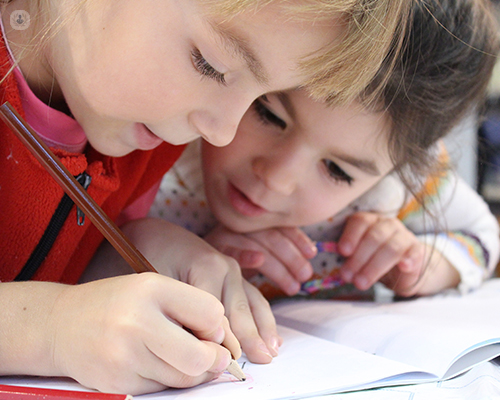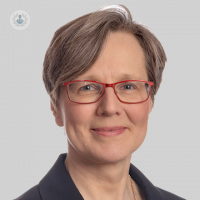Should my child be doing eye exercises?
Autore:In our day-to-day activities, our eyes have to work so we can see. Sometimes, there is a problem or a weakness in our eye muscles and this can cause vision problems, even in children. In this article, consultant ophthalmologist and eye expert Dr Annegret Dahlmann-Noor has explained what eye muscle weaknesses cause difficulty seeing something close-up for children and what parents can do to help.

Does the eye have muscles?
The eye has muscles on the outside and on the inside. The muscles on the outside of the eye move the eyeball, and the muscles on the inside help us to change focus when looking in the distance and looking at something close-up, and also change the size of the pupil, the black “hole” in the iris (blue/brown part of the eye).
On the outside of the eye, there are six muscles which move it into different directions – up and down and side-to-side. The muscles which rotate the eyeball towards the nose (medial rectus muscles) have two actions: 1. they help us look either to the left or right; 2. they rotate both eyes inwards when we look at something close-up. This movement is called “convergence”.
One muscle on the inside of the eye, the ciliary muscle, controls the shape of the crystalline lens. When the ciliary muscle contracts, it makes the lens become more rounded, increasing its focusing power. This helps us keep images in focus when we look at something close-up. This mechanism is called “accommodation”.
Lastly, there are two muscles in the iris. One muscle makes the pupil bigger, for example in a dark room or at night, and the other makes it smaller, for example in bright light. This allows more or less light into the eye, and also helps with focusing what we see.
Why do we need convergence and accommodation?
The mechanisms involved in focusing on something close-up, for example when reading or looking at fine details, are automatic. Our brains control convergence and accommodation without us having to think about it, like lungs breathing and the heart beating.
What happens in convergence and accommodation weakness?
In some children, young people and young adults, convergence and accommodation can be weak. This may cause problems with reading and close up work. In the overwhelming majority of people, this is not caused by any underlying condition.
People with convergence weakness may see objects as double when they bring them close-up. Those with accommodation weakness find it impossible to read small text and writing, because their close-up vision becomes blurred. Some children and young people can have both convergence and accommodation weakness.
Other symptoms that might present with accommodation and convergence weaknesses are eye strain and headaches, interfering with studying for school or college. These symptoms arise, because they are trying so hard to bring things into focus and keep them single.
When should I take my child to see an ophthalmologist?
If your child or young person complains of blurred vision or seeing two of everything, you should consult a specialist for eye conditions in children and young people. Young children can sometimes find it difficult to describe that they have double vision, but may close one eye when looking at something close-up. Some may complain that their eyes hurt, or may tell you that they have a headache after long periods of studying or homework.
Children’s eye doctors work closely with orthoptists, who are specialists in assessing eye movements including convergence and accommodation.
What can be done about convergence and accommodation weakness?
The orthoptist will find out whether there is a weakness and will give advice on exercises. Clinical trials have shown that exercises can improve convergence and accommodation, and the orthoptist will tailor the exercises to your child’s or young person’s individual degree of difficulty. The ophthalmologist will complete the assessment by checking the health of the eye, ensuring that there is no other eye condition contributing to the problem.
If you think your child may be experiencing vision problems, you can go to Dr Dahlmann-Noor's profile and book a consutlation.


